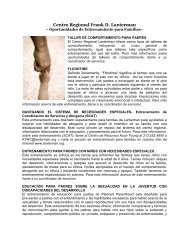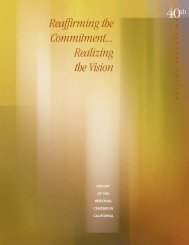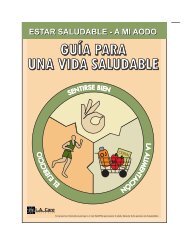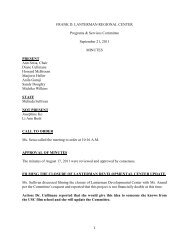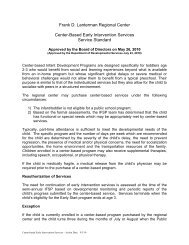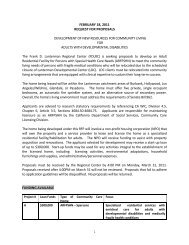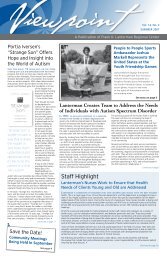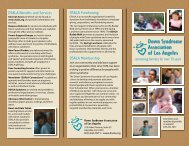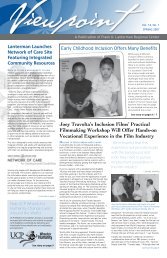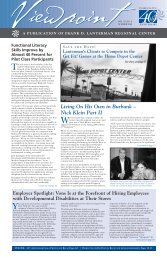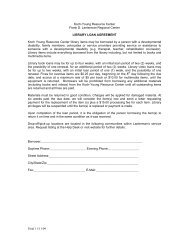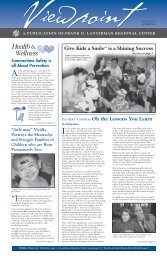Guide to Lanterman for Early Start Families - Frank D. Lanterman ...
Guide to Lanterman for Early Start Families - Frank D. Lanterman ...
Guide to Lanterman for Early Start Families - Frank D. Lanterman ...
You also want an ePaper? Increase the reach of your titles
YUMPU automatically turns print PDFs into web optimized ePapers that Google loves.
Transitioning from <strong>Early</strong> <strong>Start</strong> at Age 3<br />
The primary goal of the <strong>Early</strong> <strong>Start</strong> program is <strong>to</strong> provide<br />
intensive services early in the life of a child with the<br />
expectation that these services will allow the child <strong>to</strong> “catch<br />
up” developmentally <strong>to</strong> the point that he or she no longer<br />
needs regional center services. A majority of our <strong>Early</strong> <strong>Start</strong><br />
clients do catch up and graduate out of the Regional Center.<br />
Some of these children may still have delays that qualify<br />
them <strong>to</strong> receive services from the school district but not the<br />
Regional Center. Finally, some children continue <strong>to</strong> have<br />
diagnosed conditions that qualify them <strong>for</strong> ongoing regional<br />
center services in addition <strong>to</strong> school services.<br />
The decisions about what, if any, continuing services your child<br />
will be eligible <strong>for</strong> are made during a <strong>for</strong>mal transition process<br />
that begins when your child is 2 ½ years old. Let’s take a closer<br />
look at the decisions that are made and how the transition occurs.<br />
Transition Planning Meeting with<br />
the School District<br />
When your child is 30 months old, you will participate in a<br />
Transition Planning Meeting with representatives of the school<br />
district and the Regional Center. This meeting is required by<br />
law and introduces families <strong>to</strong> the different kinds of services<br />
available <strong>to</strong> young children through the schools. It is intended<br />
<strong>to</strong> address the necessary steps <strong>to</strong> support your child and family<br />
during the transition out of <strong>Early</strong> <strong>Start</strong> in<strong>to</strong> school services or<br />
other community programs. These include:<br />
v Review the current IFSP that guides your child’s regional<br />
center services.<br />
v Agree on assessments that will be needed <strong>to</strong> give the school<br />
district the in<strong>for</strong>mation it needs <strong>to</strong> meet your child’s service<br />
needs. The team may decide on new assessments or use<br />
some or all of the assessments that have been completed by<br />
the Regional Center, if they are current and appropriate.<br />
v A discussion of who will complete the assessments and a<br />
timeline <strong>for</strong> completion.<br />
v A timeline and steps <strong>for</strong> developing an Individualized<br />
Education Program (IEP) <strong>for</strong> your child if he or she is<br />
eligible <strong>for</strong> special education services.<br />
v The range of classroom options that may be available <strong>for</strong><br />
your child if he or she receives special education services.<br />
Continuing Regional Center Eligibility<br />
When your child turns 33 months, a multidisciplinary team from<br />
the Regional Center will review your child’s his<strong>to</strong>ry, the progress<br />
that he or she has made, and his or her current development in<br />
the following five areas: cognitive, physical, communication,<br />
social and emotional, and adaptive. If the team determines<br />
that your child satisfies the more stringent eligibility criteria <strong>for</strong><br />
continuing regional center services, he or she will be transferred <strong>to</strong><br />
a new service coordina<strong>to</strong>r in one of <strong>Lanterman</strong>’s School-Age units<br />
at age 3. Your <strong>Early</strong> Intervention service coordina<strong>to</strong>r will work<br />
with the new service coordina<strong>to</strong>r <strong>to</strong> ensure a smooth transition.<br />
For more in<strong>for</strong>mation about the over 3 eligibility criteria,<br />
visit the Department of Developmental Services Web site at<br />
www.dds.ca.gov.<br />
16<br />
<strong>Frank</strong> D. <strong>Lanterman</strong> Regional Center



